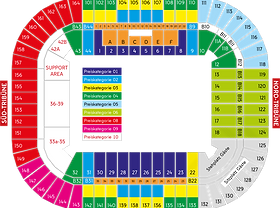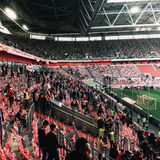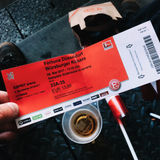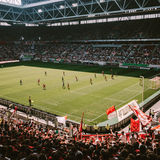
FORTUNA DÜSSELDORF
OCTOBER 2025

Founded: May 5, 1895
Club Members: 36,000
Nickname: Flingeraner
Coach: Markus Anfang
Captain: Florian Kastenmeier
German Champions / Bundesliga: 1
DFB-Pokal: 2
Bundesliga.2 Champions: 2
Western German Cup: 5
UEFA Intertoto Cup: 3
Website: www.f95.de
The origins of Düsseldorfer Turn-und Sportverein Fortuna 1895 e.V (to give them their full title) go back to the formation of a gymnastics club called Turnverein Flingern in 1895. However, as football in Germany began to grow in popularity around the turn of the 20th Century, a series of mergers between various other clubs led to the formation of Fortuna Düsseldorf in 1913 - with the rumour going around that they were simply named after a horse carriage advertising 'Fortuna Bread' !
By the late 1920s the club had moved into the Rheinstadion and were beginning to make their mark, winning a number of regional titles before becoming the first side in the Ruhr-Rhine region to be crowned national champions in 1933. Following a restructuring of the leagues under the Third Reich, Düsseldorf remained the strongest regional side throughout the 1930s - winning five top-flight Gauliga Niederrhein titles before the upheaval of World War 2 saw them form part of a combined wartime side called TSV Fortuna/SC 99 Düsseldorf.
After the war, the allied forces ordered that all sports clubs had to disband and start again from scratch as part of a post-war policy of de-Nazification in occupied Germany. Fortuna duly reformed in 1945 and emerged from this sporting 'Stunde null ' (zero hour) by competing in the regional Oberliga West Division and appearing in three DFB-Pokal finals in 1957, 1958 and 1962, all of which ended in defeat. One of the club's most famous players during this period was Anton 'Toni' Turek - goalkeeper for the legendary West German side that won the 1954 World Cup only nine years after the country had been devastated by World War 2. It remains one of the greatest achievements in German sporting history, and Fortuna fans raised funds to have a statue of him erected outside the Merkur Spiel Arena.
Fortuna missed the cut when the German FA were deciding which sixteen clubs should form the new Bundesliga in 1963 but, undeterred, achieved promotion to the top division three years later. It was brief stay however, and after a sensational opening day victory against recently crowned European Cup Winners Cup victors Borussia Dortmund, Fortuna ended the season being relegated. They returned in 1971 for another go and this time stayed for 16 seasons which included successive third place finishes in 1972-73 and 1973-74; and a thumping 7-1 victory against Bayern München in 1978 which remains to this day the Bavarian giant's heaviest away defeat. Fortuna continued to come up short in the DFB-Pokal though as bitter rivals 1.FC Köln beat them in the 1978 final. Fortune finally shone on the Düsseldorfers as they announced their arrival on the domestic stage by winning their first DFB-Pokal with victory over Hertha Berlin in 1979. They repeated the feat a year later with an even sweeter victory over eternal enemy 1.FC Köln and they were only denied a taste of European glory when FC Barcelona won a pulsating European Cup Winners Cup final in 1979 to take the trophy to Catalonia. As Fortuna became a force to be reckoned with, much of the side was built around largely local and hitherto unknown players like the Allofs brothers (Klaus and Thomas), Gerd Zewe, Dieter Herzog, Wolfgang Seel and Rudi Brommer who all went onto become internationals.
However, during the 1980s a dark cloud hung over the club as performances on the field played out against a backdrop of increasing financial problems. Relegation in 1987 triggered a yo-yo period which saw Die Flingeraner play in four different divisions over the next couple of decades including the amateur Oberliga Nordrhein as recently as 2004. In fact, they were only saved from further relegations as a result of other clubs losing their licences.
Following a gradual recovery, Fortuna re-established themselves as a Bundesliga.2 club but it was the appointment in 2016 of Düsseldorf native Friedhelm Funkel which marked began a period that ultimately has led to a Bundesliga return. That promotion in 2017-18 season saw Fortuna secure the Bundesliga.2 title with a final day victory over 1.FC Nürnberg and marked the sixth time Funkel had led a club to promotion - a German record. Düsseldorf's two year stay in the top-flight however came to an end in 2020 and the Merkur Spiel Arena currently hosts Bundesliga.2 football.


GROUND DETAILS
Ground Name: Merkur Spiel Arena
Architect: JSK Architekten
Built: 2002 - 2004
Year Opened: 2004
Capacity: 54,600 (9,917 standing)
Executive Boxes: 27
Wheelchair Spaces: 89
Construction Costs: €240m
Undersoil Heating: Yes
Running Track: No
Playing Surface: Natural Grass
Pitch Size: 105m x 68m
Website: www.mercure-spiel-arena.de
Grounds:
Lichtplatz (1908 - 1919)
Vennhauser Straße (1919 - 1930)
Flinger Broich (1930 - 1953)
Rheinstadion (1953 - 1970)
Flinger Broich (1970 - 1972)
Rheinstadion (1972 - 2002)
Paul Jahnes Stadion (2002 - 2004)
LTU Arena (2004 - 2009)
Esprit Arena (2009 - 2018) *
Merker Spiel Arena (2018 - ) *
* Stadium Renamed

Built at a cost of €240 million to replace the aging Rheinstadion and opened in 2004, The Merkur Spiel Arena is one of Germany's most modern stadiums. Like many German stadiums built around the same time, its construction merely coincided with the 2006 World Cup and it didn't host any of the tournament's matches.
Known at various times as ESPRIT Arena, LTU Arena and Düsseldorf Arena (for the 2011 Eurovision Song Contest); with its retractable roof and central heating system it feels less of a football ground and more of an indoor arena. From the outside, the stadium is initially indistinguishable from the surrounding trade centres, looking like a multi-storey car park thanks to the aluminium mesh wrapped around its facade.
Inside, apart from the 8000 ton retractable roof, the standard two-tier, box shape design of new stadiums has been followed complete with the inevitable VIP boxes. One of the most striking features of the ground are the random 'dolly mixture' multi coloured seats (amongst the otherwise grey banks of seating) which are apparently designed to make the stadium appear fuller than it is. However, the absence of red and white seating, or Fortuna banners in the stands means that it's only the word 'Düsseldorf' spelt out in dark grey seats in the East Stand that give you any indication of who plays here and consequently makes the place feel a little cold and sterile.
In general, the Fortuna home end is the Süd-Tribüne (South Stand) and the Ultras sing their lullabies from the lower tier terrace (Blocks 36-39). Away followings are directed to the north-east corner of the opposite Nord-Tribüne (North Stand) and they use Blocks 19-21 (standing) and 125-132 in the upper tier (seats).
In addition to being home to Fortuna, KFC Uerdingen 05 became tenants in 2019 whilst their own Grotenburg Stadion underwent renovation. However, the 3.Liga outfit were unceremoniously, and very publicly, kicked out in January 2021 by stadium operators D.Live after falling behind with their rent. The venue also played host to Bayer Leverkusen whilst the BayArena was under redevelopment during the 2008-09 season.
In addition to hosting football, the stadium is also used as a multi-purpose venue and when the likes of Bruce Springsteen, Madonna, AC/DC, Paul McCartney, Beyonce et al rock up the permitted capacity can be increased towards 60,000. Other events held here include the 2011 Eurovision Song Contest and World Championship Boxing including the Wladimir Klitschko v Tyson Fury fight in 2015.
BUYING TICKETS
Ticket Office:
Website: www.shop.f95.de
Telephone: +49 (0) 180 3018950
Email: service@f95.de

Average Attendance:
2024-2025: 41,488 (Bundesliga.2)
2023-2024: 39,672 (Bundesliga.2)
2022-2023: 29,583 (Bundesliga.2)
2021-2022: 17,588 (Bundesliga.2) *
2020-2021: N/A *
* Season affected by COVID pandemic
Expected Ticket Availability
With a capacity of over 54,000 and Fortuna's on-field fortunes not quite in step with their lucky-sounding name, matches only occasionally sell-out - especially in Bundesliga.2.
Most matches will therefore be a 'walk-up' and tickets will be available from the ticket booths (Note: cash-only - and there are no ATMs around the arena !) which open two hours before kick-off - although prices rise by an extra €2 (per standing ticket) and €3 (per seat) if you want to keep things traditional.
If, however, you're one of those types who feel better securing your ticket in advance, then, after setting up a ticketing account, you can secure an E-Ticket (Mobile and Print@Home) through the online shop which is presented in both German and ... Japanese. Although this sounds like an odd pairing, there is some logic to it given that Düsseldorf is home to the largest Japanese ex-pat community in Germany, and the club understandably want to generate some interest by giving them access to their local team. Ticketing and travel information is however available in English here.
Tickets are also available from the fan shops at Flinger Broich and Burgplatz (see 'Fan Shop, Museum, Stadium Tours' section below) or by calling the ticket hotline (+49 (0) 180 3018950 - €0.09/min. from landlines; max. €0.42/min. from mobiles). Tickets are delivered in your choice of E-ticket (Mobile Ticket/Print@Home) or Post (up to 6 days before the match and within Germany only) options. If you're ordering within five days of a match and want an actual (i.e. real, collectible, souvenir etc) ticket, you'll need to pick it up from the box offices at the ground from two hours before kick-off - just remember to bring the invoice number and some photo ID.
The damage that an afternoon of football at the Merkur Spiel Arena will do to your wallet depends on the quality of opposition facing Fortuna and where you want to watch the action from. Check the website for ticket prices for each game but broadly speaking, seats cost €32-57, standing on the terraces is €17 and tickets in the family block are €27 for adults and €12 per child. Discounts are also available for children, students, military personnel, disabled, unemployed etc. Free 'Lap Tickets' are also available on a matchday from the North or South ticket offices for fans aged 6, although these don't entitle the child to a seat of their own however and, as the name suggests, they must sit on their parent's lap throughout the game.
Information about visiting the Merkur Spiel Arena for fans with disabilities can be found at: www.bundesliga-reisefuehrer.de
GETTING THERE & AWAY
Stadium Address:
Arena Straße 1
40474 Düsseldorf

BY CAR:
If you are driving, use the A52 and A3 from the north, A44 and A57 from the west and A57 and A59 from the south. These will take you straight to Düsseldorf from where you can pick up signs to the Merkur Spiel-Arena and Messe Düsseldorf.
Car parking at the stadium costs €5 and home fans (and neutrals) should follow signs to car park P1 where 22,000 spaces are available. Car Park P2 (1,500 spaces) is reserved exclusively for away fans. Be aware that traffic will be very heavy if football and business collide - so be sure to check if there are any trade fairs are being held in the buildings next to the stadium.
PUBLIC TRANSPORT:
Match ticket holders can use public transport on matchdays anywhere within the Verkehrsverbund Rhein-Ruhr (VRR) transport region free of charge until 3am on the following day.
From the Hauptbahnhof or Heinrich-Heine-Alle in the Altstadt, U-Bahn 78 (Direction: Arena/Messe-Nord) leaves every five minutes and takes about 15 minutes to reach the 'Arena/Messe-Nord' station directly at the south-east corner of the stadium. This is also the end of the line so there's no danger of missing your stop. After the match, trains leave from here every couple of minutes in a typically German demonstration of efficient crowd management. From two hours before the match, an additional bus service (U78) follows the U-Bahn 78 light rail route. Bus E-730 also runs between Unterrath S-Bahn station and the Merkur Spiel-Arena. If you're coming straight from the airport, a taxi to the stadium should cost about €10 and depending on traffic will take 10-15 minutes to cover the two mile distance.
WALKING DIRECTIONS:
You can reach the stadium from the Hauptbahnhof on foot but it's a long walk - at least four miles. If you have at least 90 minutes on your hands and feel energetic then the route will take you along the banks of the Rhine to the stadium. Google Maps will be able to plan the details for you.
FAN SHOP, MUSEUM & STADIUM TOURS

FAN SHOP:
There are a number of places around the city where you can stock up on your Fortuna fanartikels. The Fan Shop Arena is located at the southeast corner of the Merkur Spiel-Arena but it only opens its doors on matchdays 90 minutes before kick-off and for 30 minutes afterwards.
The main branch is at Flinger Broich where you can also have a look at Fortuna's old ground, the Paul-Janes-Stadion next door (Flinger Broich 87, 40235 Düsseldorf;10am-6pm, Mon-Fri; 10am-2pm, Sat).
A third branch can be found in the Altstadt (old town) (Burgplatz 2, 40213 Düsseldorf; 10am-7pm, Mon-Fri; 10am-6pm, Sat).
STADIUM TOUR:
Guided 90 minute tours of the Merkur Spiel Arena are available on Sundays for €5. Further information, availability and how to book can be found here.
FOOD & DRINK OPTIONS
There are very few pre-match food and drink options in the area surrounding the stadium - none in fact. However, the bars and restaurants of Düsseldorf's beautiful Altstadt are only a 15-minute tram ride away.
In the ground itself, you can fill up on the usual German football fayre of bratwursts, chips, frikadellen etc. Given the 'indoor arena, trade fair' - like feel to the place, it's the type of stadium where you would expect a pre-loaded card scheme to be in operation. There isn't as it happens although when buying from the kiosks within the stadium itself, you'll have to pay for your stadium sausage using contactless payment methods. On the stadium forecourt however, everything can be paid for with cash.
Düsseldorf is famous for it's dark, reddish-brown Altbier which is traditionally served in third-of-a-pint glasses. The money on offer from Carlsberg however obviously won the day and the Danish brew is the official stadium beer. Of course, you can still enjoy the match with a few pints of Schumacher Alt (€5.20 a glass) but any request for a Kölsch (the city of Cologne's contribution to beer) will be met with stern looks and a probable escort from the ground for your own safety.
STORAGE OF BACKPACKS & BAGS
Small bags can be taken into the stadium after a quick once over from security but anything larger than an A4 sheet of paper (i.e backpacks, large bags) will have to be stored in the drop-off containers by each entrance. Storage space is limited though and so unless you turn up really early, it's probably best if you leave stff back at the hotel or make use of the lockers (Schließfächer) at Düsseldorf Hauptbahnhof.


























